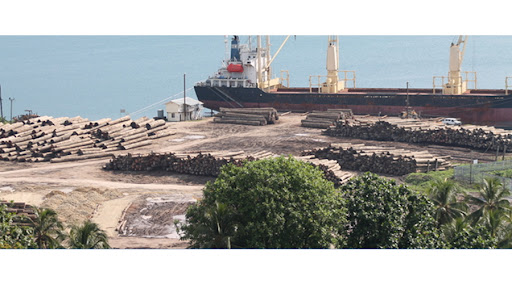15 November 2021
Radio New Zealand has reported today that despite a generally mixed response to what has been achieved at COP26, one of Papua New Guinea's leading voices against illegal logging is encouraged by new commitments made in Glasgow.
Quote.
The global climate talks resulted in commitments on protecting rainforests by multilateral development banks and financial institutions to align their practices with goals in the Paris Agreement which aimed to curb deforestation.
The United Kingdom's Minister of State for Pacific and the Environment, Zac Goldsmith described the commitments as being significant and augmentative of "unprecedented commitments" from governments to limit deforestation.
"We have financial institutions with nearly 9 trillion dollars of assets making the same commitment. And that means that even reluctant countries, those we struggled to get to the table, really can't avoid that market signal.
"If a country is going to lose access to the market by not being sustainable, they will become sustainable," Goldsmith explained, adding that as the current holder of the COP presidency, the UK would hold countries accountable for such commitments.
It's a step in the right direction, according to the Governor of PNG's Oro Province, Gary Juffa, a long-time campaigner against illegal logging who attended COP26 where he represented PNG's Prime Minister James Marape, who was absent, in various meetings.
Juffa also attended Glasgow to promote Oro Province's Managalas conservation project which seeks to preserve and conserve local forests while implementing a land management program with the support of international organizations keen to mitigate climate change, including the Center for International Forestry Research and the International Council for Research in Agroforestry.
Banks and logging
Juffa said Glasgow was the first COP to feature serious discussions about the depletion of rainforests, which is rapidly taking place in both PNG and Solomon Islands due to illegal logging.
"They're operating using a trans-national crime model, in that many of their efforts are actually in breach of various laws of the country. And the banks actually facilitate this by allowing them (logging interests) to use their services in the processing of what are essentially the proceeds of crime."
The rainforests of New Guinea, on both the Indonesia and PNG sides of the giant island, represent some of the last remaining substantial tracts of native forest anywhere on the planet.
According to Juffa, protecting the forests is a crucial tool in mitigating climate change, echoing recent calls by Marape to the global community to help PNG preserve the cradle of 13 percent of the world's tropical rainforests and 6 percent of its bio-diversity.
"For me specifically and personally, it's a huge breakthrough," Juffa said of COP26.
"Because it comes at a time when we're also embarking on a major, ambitious conservation project in my province which has received very good indications that it will be funded by entities that will look at putting together a fund of about a hundred and fifty million euros over a period of ten years. So that's significant."
He said he was hopeful that it would work out well "because it means that we can take real serious steps on behalf of our province, country and indeed the world" on preventing deforestation.
Accountability
Earlier, the head of PNG's delegation to Glasgow, its Environment, Conservation & Climate Change Minister Environment Minister, Wera Mori, told the summit his country may have to "rethink" cutting logging and refraining from coal mining if developed countries didn't take ownership of addressing climate change.
It illuminated the development bind that the climate crisis creates for Pacific countries.
Wori said if climate financing was not forthcoming and accessible then PNG "cannot be swimming around in the wilderness", as it had a massive forestry resource as well as thousands of square kilometres of coal seam which could be mined and used to produce cheap energy for its industries.
A similar argument is put forward by one of the world's largest carbon emitters, India, as its government persists with coal power, saying the country is "entitled to the responsible use of fossil fuels".
Along with China, India was instrumental in watering down the wording on coal in the COP agreement so that in the final document countries agreed to "phase down" rather than "phase out" coal.
But Gary Juffa said in the case of PNG's comments, some framing was required for developed nations to see the perspective of others.
"I mean the developed nations have taken a very arrogant position: 'Oh look, the world is in a terrible state and you developing nations need to stop doing all these terrible things you are doing that's making things worse'.
"But if you were to measure the destruction to the environment, and say who contributed the most, the developing nations probably contributed less than ten percent," Jffa said.
"Ninety percent of the destruction which brought us to where we are right now, staring at the precipice, that was done by the developed nations.. whose destructive use of energy and other resources they had at their finger tips, liquidated most of the environment to get us to where we are.
"They can't just stand on one side and say 'you need to stop this'. What are they doing to help?"
.rTable { display: table; width: 100%;} .rTableRow { display: table-row; } .rTableHeading { background-color: #ddd; display: table-header-group; } .rTableCell, .rTableHead { display: table-cell; padding: 3px 10px; border: 1px solid #999999; } .rTableHeading { display: table-header-group; background-color: #ddd; font-weight: bold; } .rTableFoot { display: table-footer-group; font-weight: bold; background-color: #ddd; } .rTableBody { display: table-row-group; }



